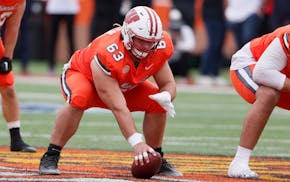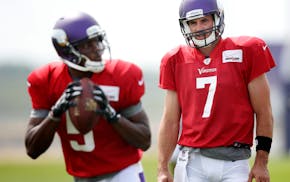More than a century's worth of rule changes have merged with today's exceptional skill players to form the perfect storm of NFL point production.
With two weeks left in the 2013 season, the NFL is averaging 47.5 points per game. The record is 46.5, set in 1948, when there were 10 teams playing a 12-game schedule.
"It's starting to feel like if you don't score a touchdown every time you get the ball, you're losing serve," Vikings left guard Charlie Johnson said. "I know with us [Sunday], that was the emphasis. It wasn't an indictment of our defense, either. That's just how the Eagles had been playing. Like a lot of teams have been playing."
The Vikings scored 48 points. The Eagles scored 30 and became one of a record five teams to reach that many points and lose in the same week.
An NFL record for most points in a single day (763) was set Sunday. Six days earlier, the record for most touchdowns in a single week (90) was set.
"I know the NFL says scoring is well-liked among fans," Johnson said. "So I don't think high scores are going anywhere. It may get worse. It may get to the point where it starts looking like Arena Football."
To understand where the league is going, let's look at where professional football has been. The American Professional Football Association was formed in 1920 and changed its name to the National Football League in 1922. But pro football dates to 1892, when the Allegheny Athletic Association paid William "Pudge" Heffelfinger $500 to play a game against the Pittsburgh Athletic Club.
Oct. 25, 1906: Massillon's George Parratt took advantage of that year's new rule by completing the first forward pass to Dan Riley in a victory over Benwood-Moundsville.
Feb. 25, 1933: Capitalizing on innovations made necessary from having to play the 1932 title game indoors, the NFL adopted the first hash marks and legalized passing from anywhere behind the line of scrimmage. Previously, passes had to be made more than 5 yards behind the line of scrimmage.
1945: Hashmarks were moved from 15 to 20 yards from the sidelines. In 1972, they were moved to 23 yards, 1 foot, 9 inches.
April 25, 1974: Penalties for offensive holding, illegal use of hands and tripping were reduced from 15 to 10 yards.
1977: The head slap, a favorite weapon on pass rushers, was outlawed.
March 17, 1978: A huge day in the evolution of scoring. Rule changes limited contact with receivers to within 5 yards of the line of scrimmage, and permitted pass blockers to extend their arms and open their hands.
March 16, 1979: Quarterbacks got extra protection with the passing of the "in the grasp" rule.
1980: Greater restrictions were placed on contact in the area of the head and neck.
March 22, 1994: Roughing-the-passer rules are strengthened.
March 24, 2010: Protection for defenseless players was expanded to protect a player who has just completed a catch from blows to the head or neck by an opponent who launches. A fear of going over the middle starts to disappear.
With 10,631 points through 14 games, the NFL is on pace for 12,150 for the year. Not only did that set a record for the third consecutive season, it also shattered last year's mark by 794 points.
The Broncos have 535 points and are on pace for the first 600-point season (611). Denver quarterback Peyton Manning is on pace to pass for 5,498 yards and 54 touchdowns, both of which would be records.
Vikings coach Leslie Frazier said earlier this season that a coach needs to plan on scoring at least 24 points on average. Then he stopped himself and added, "At least that was the case a year ago. It seems like it's rising."
Monday, Frazier said the trend in more scoring is altering some of the standard coaching decisions.
"I think you see a lot more teams going for it in fourth-down situations," Frazier said. "People are throwing the ball on third-and-1 a lot more, third-and-2 a lot more than they would have in years past because of how liberal the rules are when it comes to defensive pass interference and some of the other things that occur."
Have the rules gone too far in favor of the offense?
"Well, the game is so popular," Frazier said. "[Scoring] kind of drives the engine. … The popularity of our league really drives what happens for all of us that are involved. So I'm not sure it'll change anytime soon."
Mark Craig • mcraig@startribune.com

O'Connell has spent life around QBs. Can that help Vikings draft one?

Tackles are solid, but Vikings' offensive line still has big needs

Drafting QBs in the first round: How's that gone for Vikings?
Vikings GM finds himself looking up at his NFC North peers

